As a journalist and former TV news and sports broadcaster, I have been covering girls' and women's fight for sports equity for nearly five decades. That's why I was infuriated but not surprised by the disturbing and blatant inequities between the facilities and even food (!) provided for male and female athletes competing at this year's NCAA March Madness college basketball tournaments.
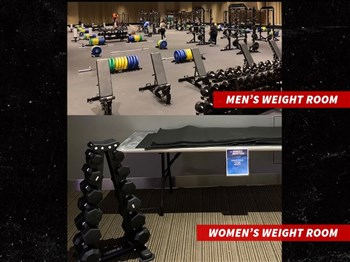 When female athletes and coaches used their social media power to showcase the differences, the NCAA began scrambling to apologize with excuses. A "lack of space" was the explanation for female athletes given only a rack of dumbbells and a pile of yoga mats compared with the gigantic, fully-equipped weight room for the men. That was proven to be false, as a dramatically upgraded weight room for women "magically" appeared overnight.
When female athletes and coaches used their social media power to showcase the differences, the NCAA began scrambling to apologize with excuses. A "lack of space" was the explanation for female athletes given only a rack of dumbbells and a pile of yoga mats compared with the gigantic, fully-equipped weight room for the men. That was proven to be false, as a dramatically upgraded weight room for women "magically" appeared overnight.
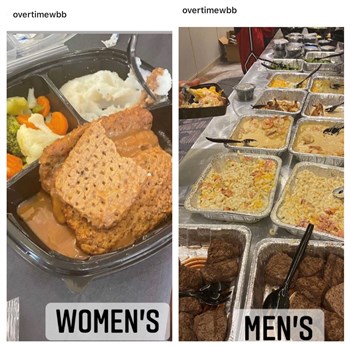 And how did the NCAA justify the dramatic differences in food, with men choosing from buffets while women were given boxed meals; the gold standard (PCR) of COVID testing for men's teams while a cheaper, less accurate (antigen) testing authorized for the women; and even the pettiness of including a 500 piece puzzle in the men's extravagant "swag bags," while women's much smaller offerings included a 150 piece puzzle?
And how did the NCAA justify the dramatic differences in food, with men choosing from buffets while women were given boxed meals; the gold standard (PCR) of COVID testing for men's teams while a cheaper, less accurate (antigen) testing authorized for the women; and even the pettiness of including a 500 piece puzzle in the men's extravagant "swag bags," while women's much smaller offerings included a 150 piece puzzle?
They couldn't, other than to admit it was "a mistake" and promise "a full investigation," once their hypocrisy was exposed.
The disciminatory and disgraceful discrepancies created an uproar, once the athletes took to Instagram, Twitter and TikTok. But they were not "an oversight," as the NCAA tried to claim. They were business as usual.
 In 1974, two years after the passage of Title IX federal legislation that required schools to begin offering equal sports opportunities for girls, I reported on Little League baseball coaches, irritated to have to give girls the chance to try out for their teams, who required the girls to wear male athletic cups, claiming, "If you want to play with the boys, you need to dress like the boys."
In 1974, two years after the passage of Title IX federal legislation that required schools to begin offering equal sports opportunities for girls, I reported on Little League baseball coaches, irritated to have to give girls the chance to try out for their teams, who required the girls to wear male athletic cups, claiming, "If you want to play with the boys, you need to dress like the boys."
That same year, I covered a middle school track meet in Grand Rapids, Michigan where several female students went out for the school's track team, which had previously been only for boys. I witnessed the determination and courage of the handful of teenage girls who endured taunts and jeers of parents who were terrified that their sons might be psychologically damaged if a girl happened to beat them in a race.
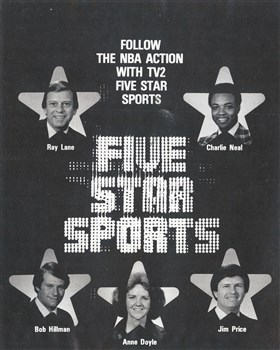 A few years later, while working for CBS-TV in Detroit, I produced a 30-minute documentary, "Playing to Win, on the status of women's sports progress in Michigan, seven years after the passage of TITLE IX.
A few years later, while working for CBS-TV in Detroit, I produced a 30-minute documentary, "Playing to Win, on the status of women's sports progress in Michigan, seven years after the passage of TITLE IX.
 During my research, I discovered that University of Michigan's legendary and powerful athletic director, Don Canham, was using Athletic Department funds to pay for legal challenges against Title IX. He was furious that a young, female sports reporter dared to question him on that decision during my on-camera interview and called my station management to complain. His on-camera arrogance and irritation at his decisions behing challenged made great TV viewing, but barely budged his resistance to women's sports.
During my research, I discovered that University of Michigan's legendary and powerful athletic director, Don Canham, was using Athletic Department funds to pay for legal challenges against Title IX. He was furious that a young, female sports reporter dared to question him on that decision during my on-camera interview and called my station management to complain. His on-camera arrogance and irritation at his decisions behing challenged made great TV viewing, but barely budged his resistance to women's sports.
That same year, the Michigan State Lady Spartans basketball team sued their own university over blatant Title IX violations. I sat in a Grand Rapids District coutroom, listening as the athletes told of travelling to games crammed into stations wagons, sleeping two to a bed and four to a room and eating at McDonald's because of miserly per diems while the men's team stretched out in chartered buses and individual beds on road trips with generous food budgets. I witnessed the women practicing on a court with buckets to catch water dripping from a leaky roof.
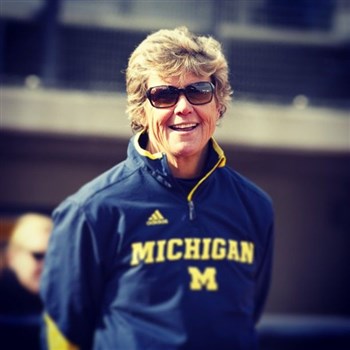 The lead plaintiff in the "Hutchins vs. MSU Board of Trustees" lawsuit was Carol "Hutch" Hutchins, now the Hall of Fame women's softball coach at the University of Michigan.
The lead plaintiff in the "Hutchins vs. MSU Board of Trustees" lawsuit was Carol "Hutch" Hutchins, now the Hall of Fame women's softball coach at the University of Michigan.
My memories are just of few of the thousands, probably millions of examples of the inequities, obstacles and resistance that girls and women have faced over our nearly 50 year fight for the equity in sports opportunity that Title IX required. It is long past time for the pathetic charade of equity to be revealed and ended. Men's sports didn't start out as geese all laying golden financial eggs. Their popularity and fan base and pipeline of athletes have been built over a century of investment, beginning with school teams and coaches and nurtured with scholarships and hundreds of millions in marketing.
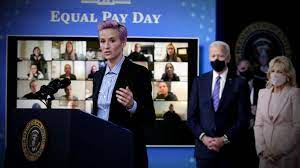 World Cup Champion Soccer Player Megan Rapinoe testified during recent Congressional hearings on Equal Pay Day that we still don't know the real potential of women's sports. "What we know is how successful women's sports have been in the face of discrimination, in the face of a lack of investment in every level in comparison to men."
World Cup Champion Soccer Player Megan Rapinoe testified during recent Congressional hearings on Equal Pay Day that we still don't know the real potential of women's sports. "What we know is how successful women's sports have been in the face of discrimination, in the face of a lack of investment in every level in comparison to men."
The sports gender inequities that still exist today are gigantic and, according to the sports advocacy non-profit Champion Women, include:
-- Non-compliance with federal laws by too many high school and college sports programs
-- Sexual assault issues, as high school and colleges too often are more concerned with protecting athletes accused of sexual assault than ensuring a safe campus environment
-- Women coaches face discriminatory employment practices, particularly in colleges, receiving for less pay than their male counterparts and locked out of the marketplace for coaching men's teams while nearly 60% of women's college teams are now coached by males.
I applaud the female athletes and coaches who refused to quietly accept second class treatment. They are continuing the work of the of the girls and young women whom I witnessed stepping onto fields and tracks where they were not wanted, ignoring harassment and insults and even suing their own universities all for opportunities our culture teaches boys to take for granted.
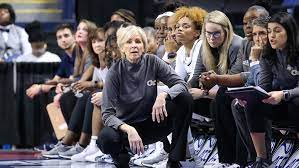 So let's celebrate how far we've come, thanks to the multitude of leaders who have stood up for decades for the promise of Title IX. Let's keep pushing for the sports equity through organizations such as CHAMPION WOMEN. And don't forget to thank the NCAA, as Georgia Tech coach Nell Fortner so eloquently did, for exposing its true colors.
So let's celebrate how far we've come, thanks to the multitude of leaders who have stood up for decades for the promise of Title IX. Let's keep pushing for the sports equity through organizations such as CHAMPION WOMEN. And don't forget to thank the NCAA, as Georgia Tech coach Nell Fortner so eloquently did, for exposing its true colors.
 "To the NCAA: Thank you! And thank you to the next generation of female athletes who are unwilling to accept discriminatory and disrespectful treatment and have the social media power to expose it! Thank you for using the three biggest weeks of your organization's year to expose exactly ho wyou feel about women's basketball -- an afterthought. It's time for women's basketball to receive the treatment it has earned. Thank you for exposure." Nell Fortner
"To the NCAA: Thank you! And thank you to the next generation of female athletes who are unwilling to accept discriminatory and disrespectful treatment and have the social media power to expose it! Thank you for using the three biggest weeks of your organization's year to expose exactly ho wyou feel about women's basketball -- an afterthought. It's time for women's basketball to receive the treatment it has earned. Thank you for exposure." Nell Fortner
Enjoy this year's women's NCAA March Madness Basketball Championships. I'm picking Baylor to give UConn a run for its money!